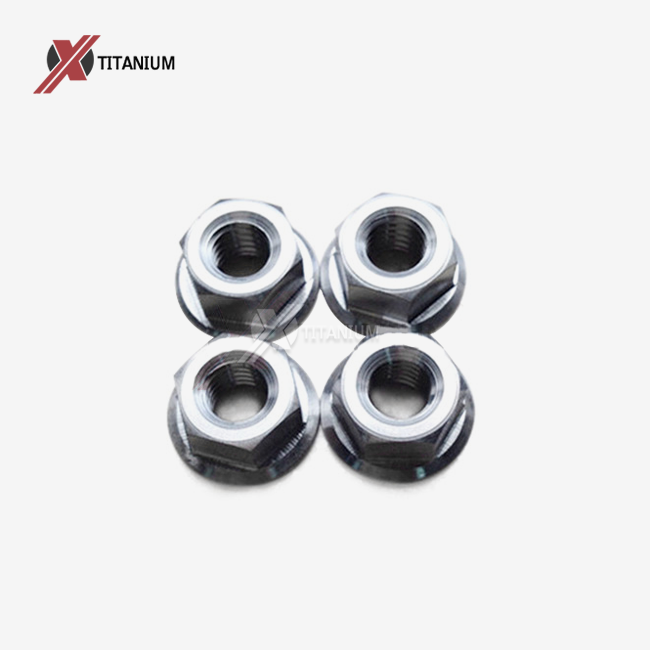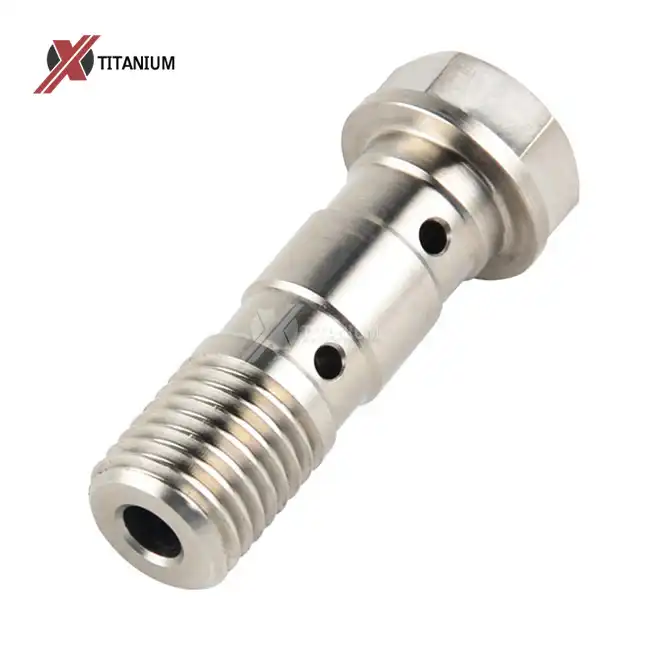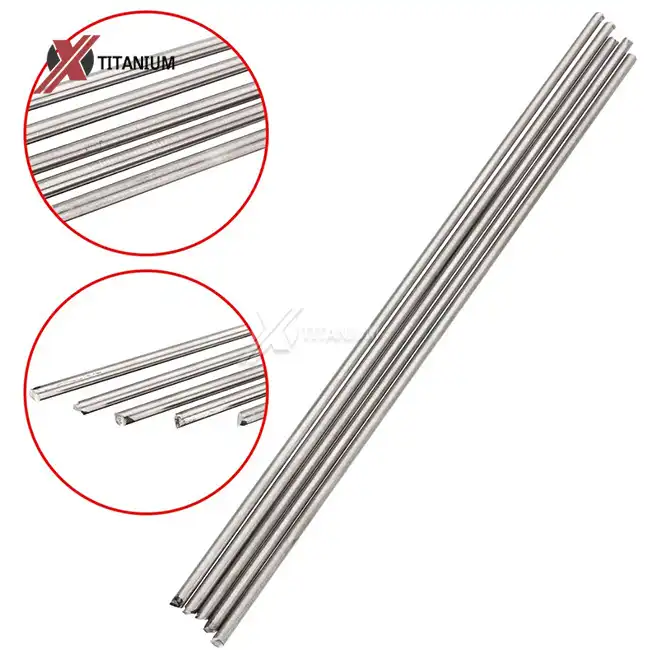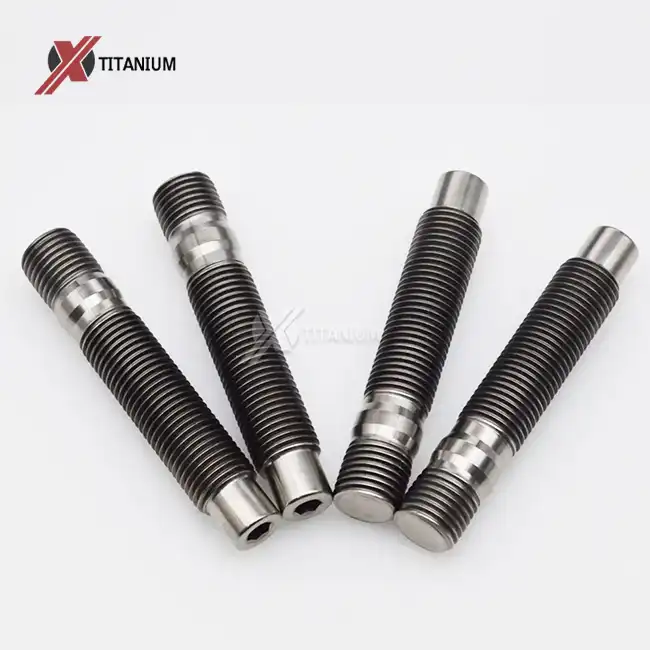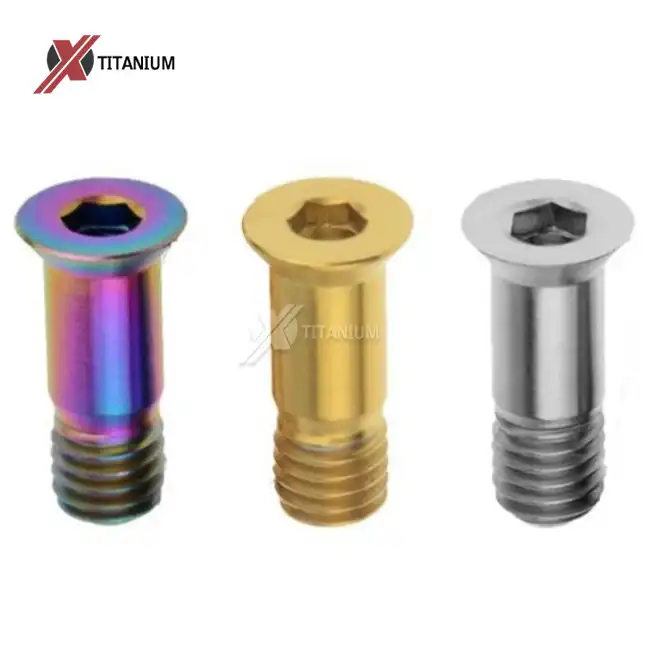Comprehending Titanium Flange Nuts and Anodization
The Composition and Properties of Titanium Flange Nuts
Titanium flange nuts are precision-engineered fasteners crafted from high-grade titanium alloys, typically Grade 5 (Ti6Al4V). This alloy composition confers an exceptional blend of strength, lightness, and corrosion resistance. The flange design of these nuts provides a wider bearing surface, which distributes load more evenly and reduces the risk of loosening under vibration or stress.
The inherent properties of titanium make these flange nuts highly sought after in demanding applications. Their low density, coupled with high tensile strength, results in a superior strength-to-weight ratio. This characteristic is particularly valuable in weight-sensitive industries such as aerospace and high-performance automotive manufacturing. Moreover, titanium's natural resistance to corrosion, even in harsh environments like saltwater, makes these nuts ideal for marine and chemical processing applications.
The Anodization Process and Its Effects on Titanium
Anodization is an electrochemical process that enhances the surface properties of titanium. During this treatment, the titanium flange nut is immersed in an electrolyte solution and subjected to an electrical current. This process creates a controlled, protective oxide layer on the surface of the titanium.
The anodization of titanium flange nuts results in several beneficial changes:
- Increased surface hardness, improving wear resistance
- Enhanced corrosion resistance beyond titanium's natural properties
- The ability to produce a range of colors without using paint or dyes
- Improved adhesion for subsequent coatings or treatments
- Creation of a stable, non-conductive surface layer
The thickness and properties of the anodized layer can be precisely controlled, allowing manufacturers to tailor the surface characteristics to specific application requirements. This level of customization is a significant advantage of anodized titanium flange nuts over their non-anodized counterparts.
Key Advantages of Anodized Titanium Flange Nuts
Enhanced Corrosion Resistance
While titanium itself is known for its excellent corrosion resistance, anodization takes this property to new heights. The anodized layer forms a barrier that is virtually impenetrable to most corrosive substances. This enhanced protection is crucial in applications where the flange nuts are exposed to aggressive chemicals, saltwater, or other corrosive environments.
The improved corrosion resistance of anodized titanium flange nuts translates to several practical benefits:
- Extended service life in harsh conditions
- Reduced maintenance requirements and associated costs
- Improved reliability in critical systems
- Preservation of structural integrity over time
Improved Wear Resistance and Durability
The anodization process significantly increases the surface hardness of titanium flange nuts. This hardened layer provides superior resistance to abrasion, scratching, and general wear. In applications where the nuts are subject to frequent assembly and disassembly or exposed to abrasive particles, this improved durability is invaluable.
The enhanced wear resistance contributes to:
- Longer component lifespan
- Maintained precision in critical assemblies
- Reduced risk of particle contamination from wear debris
- Improved performance in high-vibration environments
Aesthetic and Functional Color Options
One of the unique advantages of anodized titanium flange nuts is the ability to produce a wide range of colors without the use of paints or dyes. The color is an integral part of the anodized layer, created by light interference within the oxide film. This coloration is not only aesthetically pleasing but also serves functional purposes.
The color options available through anodization offer several benefits:
- Color coding for easy identification of different sizes or grades
- Improved visual inspection and quality control
- Enhanced aesthetics for visible applications
- Customization options for brand identity or specific project requirements
It's important to note that the color of anodized titanium flange nuts is extremely durable and will not chip, peel, or fade like painted surfaces. This longevity ensures that the functional and aesthetic benefits of coloration are maintained throughout the component's lifecycle.
Applications and Industries Benefiting from Anodized Titanium Flange Nuts
Aerospace and Aviation
The aerospace industry is perhaps the most prominent beneficiary of anodized titanium flange nuts. In this sector, every gram of weight matters, and the reliability of components is paramount. Anodized titanium flange nuts offer the perfect balance of lightweight construction and exceptional strength, making them ideal for aircraft structures, engine components, and satellite systems.
Key advantages in aerospace applications include:
- Significant weight reduction compared to steel fasteners
- Resistance to extreme temperature fluctuations
- Compatibility with carbon fiber and composite materials
- Enhanced fatigue resistance for long-term reliability
Marine and Offshore Industries
In marine environments, corrosion is a constant threat to metal components. Anodized titanium flange nuts excel in these conditions, offering unparalleled resistance to saltwater corrosion. This makes them invaluable in shipbuilding, offshore oil and gas platforms, and underwater robotics.
Benefits in marine applications include:
- Extended service life in saltwater environments
- Reduced maintenance and replacement costs
- Improved safety and reliability of critical systems
- Resistance to marine biological fouling
Medical and Biomedical Engineering
The biocompatibility of titanium, combined with the enhanced properties provided by anodization, makes anodized titanium flange nuts highly suitable for medical applications. They are used in surgical instruments, implantable devices, and medical imaging equipment.
Advantages in medical applications include:
- Biocompatibility for use in implants and prosthetics
- Non-allergenic properties for patient safety
- Ability to withstand repeated sterilization processes
- Customizable surface properties for specific medical requirements
High-Performance Automotive and Motorsports
In the world of high-performance automobiles and motorsports, every component must balance weight, strength, and reliability. Anodized titanium flange nuts find their place in engine components, suspension systems, and chassis construction, where their unique properties contribute to overall vehicle performance.
Key benefits in automotive applications include:
- Weight reduction for improved fuel efficiency and performance
- High strength-to-weight ratio for structural components
- Heat resistance for use in high-temperature engine environments
- Aesthetic appeal for visible components in luxury vehicles
Conclusion
Anodized titanium flange nuts represent a pinnacle of fastener technology, offering a unique combination of strength, lightness, and durability. Their enhanced corrosion resistance, improved wear characteristics, and aesthetic versatility make them indispensable in a wide range of high-performance applications. From the depths of the ocean to the heights of aerospace, these specialized components continue to push the boundaries of what's possible in engineering and design.
As industries continue to demand more from their materials and components, anodized titanium flange nuts stand ready to meet these challenges. Their ability to perform reliably in extreme conditions while offering weight savings and longevity makes them a smart choice for engineers and designers across various sectors.
For those seeking to leverage the advantages of anodized titanium flange nuts in their projects or products, it's crucial to work with experienced manufacturers who understand the intricacies of titanium anodization. Baoji Chuanglian New Metal Material Co., Ltd. specializes in producing high-quality titanium products, including anodized titanium flange nuts. To learn more about how these advanced fasteners can benefit your applications, reach out to our team of experts at info@cltifastener.com or djy6580@aliyun.com.
